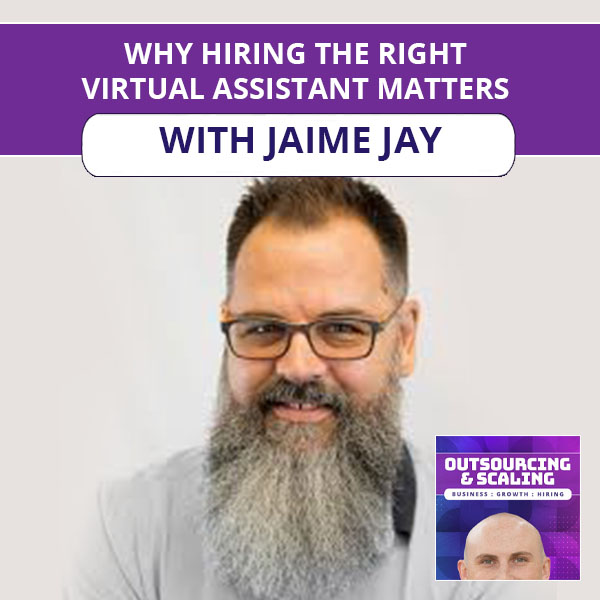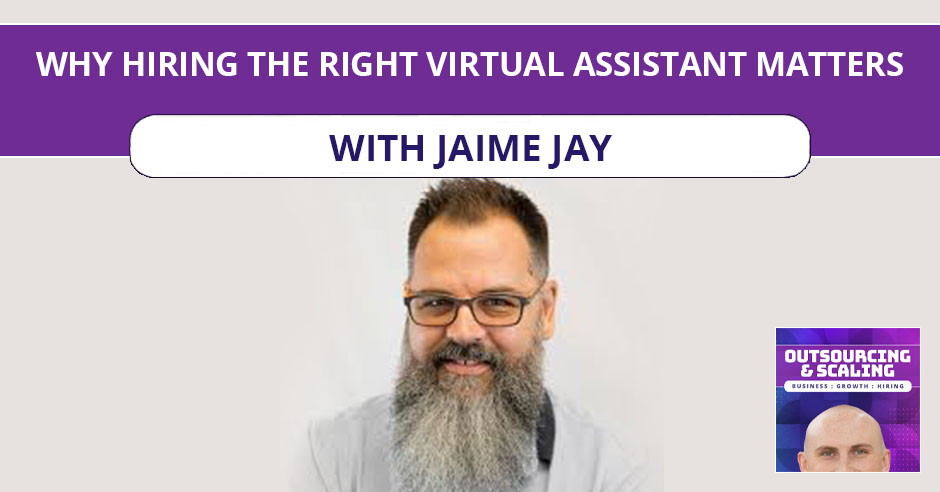


Everyone would agree that hiring virtual assistants and delegating tasks to them have saved a lot of money and time for team leaders. The challenge with this is working with people you cannot physically see and talk to but trusting your business to them. Today, Nathan Hirsch talks to Jamie Jay, the Founder and Managing Director of Bottleneck Virtual Assistants. Together with his amazing team, Jaime is offering professional growth opportunities for ambitious leaders. He discusses the pros and cons of hiring VAs and shares some tips for acquiring the right ones.
—
Listen to the podcast here:
[smart_track_player url=”https://www.podetize.com/statsapi/www.podetize.com/wp-content/uploads/fileuploads/11-5b145ef137b51b3d1af0633e9305c43d/01/2020/31788073277f6e0d8ad59055d764d320.mp3″ title=”Why Hiring The Right Virtual Assistant Matters With Jaime Jay” artist=”Nathan Hirsch” image=”https://freeup.net/wp-content/uploads/2019/04/OAS.png” ]
Download the audio file here.
Why Hiring The Right Virtual Assistant Matters With Jaime Jay
My guest is Jaime Jay. Jaime, how are you doing?
I’m doing fantastic, Nathan. Thank you so much for having me.
I’m excited to talk to you. I know you had me on your show. We both have very similar mindsets when it comes to hiring and outsourcing and building a team. For those of you that don’t know, Jaime is the Founder and Managing Director of Bottleneck Virtual Assistants. Together with an amazing team, they offer professional growth opportunities for ambitious leaders by creating an efficient and systematic approach to identify, hire and cultivate team members who focus on specific roles and responsibilities. Jaime, we’re going to talk all about that but first, let’s take a gigantic step back. What were you like growing up as a kid? Were you a straight-A student? Were you a rebel? Did you always know you wanted to be an entrepreneur?
I did get straight-As one time in ninth grade. I was excited about that. Other than that, it’s pretty much Bs, Cs and a couple of A’s floating around there. One time I did and I was proud. This is me as a kid driving down the 57 Freeway in Irvine, California. If you’re familiar with this part of the world in California, it’s a lot of businesses, high rises and things like that. I remember sitting in the back of our car coming back from a trip from Riverside back to where we lived in Huntington Beach. We were coming down to 57 Freeway and I looked up. It was at night and I could see the light on in the corner office at the very top of the building. I was probably 14, 15, 16, somewhere in there thinking, “That’s going to be me someday sitting in that corner office like that.” How many kids think of that? They’re thinking maybe firemen, policemen or something.
I was thinking about being an executive for a business. I didn’t even know what that meant at the time. My brother and I, we did the lemonade stands. We lived on a golf course. We’d jump in the lake and get the golf balls and we would sell those. We strategically placed ourselves on the opposite side of the pro shop. When people came around because they lost a couple of balls, they wanted to buy another one. The ones with little hashes in them, we charge $0.25 and then the perfect ones, we charge $1. We’d also have ice-cold lemonade so they could get lemonade for $1. If they bought a ball and a lemonade, then we’d give them $0.50 off. We did well with that. As far as entrepreneurial-minded, I’d been since I was a kid.
Let’s move past the kids’ stuff. As an adult, what would you say was your first adult business venture and how did that go?
I used to work in radio and I told them, “I was leaving because I wanted to start my own deal, my own thing.” They said, “Are you sure you want to do this? It’s hard.” I said, “I’m sure.” What I wanted to do was do SEO at the time. That was about 2004, 2005 maybe, somewhere right around there. I went out on my own. My very first client was a radio station. I did SEO for the radio station and then I started an advertising agency for real estate folks in 2006. That was my first real venture where we had staff and all of that stuff. That was my first business entity that failed. We were in the real estate business and in 2008, the financial crisis hit. We lost 72 clients in the span of about three months.
What’s the biggest lesson that you learned? For me, failures are that huge opportunity to learn something that you wouldn’t otherwise know.
This is why I’m doing Bottleneck now. I learned two things. The first thing was in a financial crisis, the first thing that businesses stop doing is advertising. Me, I would like to double down on advertising. That’s what happens. People’s budgets freeze up and the next thing to go is their staff because that’s a high cost. It’s very expensive to staff your business. I said, “When the next crisis hits, I want to make sure that I can be as recession-proof as possible.” How do I do that? That’s why I got into Bottleneck because a lot of people can source unbelievable talent for 75% of what it would cost somebody. You don’t have electricity, workstations, computers and unemployment insurance. When you fire somebody, you pay up to 75% of their salary for the next six months. You don’t have any of that with a virtual assistant and the hourly cost is a flat rate. You’re not doing the FICA and the taxes and all that extra stuff that you got to take on as a business owner. It’s a lot more flexible. There are pros and cons to every single decision that you make. That’s the reason why I wanted to get into this business. That was the lesson that I learned.

Talk to me about your first outsourcing experience. Do you remember the first, second or third person that you hired and how that went? I remember mine and it was a culture shock. I had no idea. I never talked to someone in the Philippines before and everything was new to me. Can you talk about your experience?
It was in April of 2006 and I remember because it was before my birthday in 2006 when we launched the new company. We had thirteen staff members and three of which came into the office. They were local to where we were, but ten of them were all from the Philippines. I had no idea this was even an option. The business partner that I went into business with lived in California and he owned a real estate agency. He was a broker and he wanted to start this business with me. I said, “Of course.” He introduced me to people in the Philippines. I happened to be out in Cebu City at the time and it was amazing. We had a magazine that we produced. We did a monthly distribution of 12,000. We would have graphic designers and they would do the layout. The only thing we had in the US at the time was the actual printing.
We had graphic designers, web developers, production manager and operations manager. We had salespeople that would reach out and get the advertising for us. We did it quite a bit. We also had salespeople in the US, but we had an entire little operation. I specifically remember going over and talking to them and working with it. It was funny because there was a bit of a disconnect between the cultures. I would work with them weekly on how to talk, carry on conversations, the right questions to ask, how to respond, to not be afraid of asking for an appointment or to continue on the relationship. That was my first real experience with the Filipino culture. It blew me away because of how kind they were, how dedicated they were, how supportive they were, how loyal they were. It was amazing. That’s what started me on the whole thing. I’ve worked outsourcing since 2006.
If someone’s reading and they haven’t hired someone outside of the US, what are the top few things that they should be aware of?
This could be an episode in and of itself, but I’ll try to summarize the best I can. The top three things going into this is setting your expectations. The biggest challenge that I see with people like you and me, business leaders is being able to delegate and knowing how to delegate. Knowing and having the power to give up a little bit of what it is that you’re doing is a huge step. It’s setting your expectations properly in the beginning so that you understand what’s going on. If I can delegate a task to somebody that can do the task 80% as good as me or better, I should be happy. Because if it’s my baby, I’ve set everything up, it’s what I know, what I live and I’m speaking I as in you as business leaders. It’s what we do and we know it best. However, there are certain repetitive tasks that you can delegate.
People have a hard time. Maybe they don’t want to give you access to email. Maybe I don’t want to give somebody my credit card information. I’ll give you a great example. I changed banks. Instead of me taking 4, 5, 6, 10 hours to go and research the banks, call them up, set up an appointment, travel to the bank, that takes a long time, I had my assistant do the research. I gave her, “This is what I’m looking for.” She did the research. She set up all the appointments for me. She talked to the personal bankers before I ever got there to make sure that they were in line with what I wanted. Within about two hours, I met with two different banks and I met the person that I ultimately went with. Instead of taking me ten hours to do that project, it took me about two hours.
What about building a remote culture? What mistakes do you see people make and what do you do to make that culture good? A lot of people think, “It’s remote, we’re not going to have that same culture that I had everyone next to me and we could grab a beer after work,” and all that stuff. What do you say to people that think like that?
This is totally up to whomever that person is. In my opinion, and you can ask anyone on our staff, we’ve created an unbelievable culture. Everybody has the power to make their decisions. Everybody on our staff that works remotely creates their job roles and responsibilities. They create their workflows. That empowers them to be part of it. The other big thing is to have consistent meetings. We have one meeting a week with the entire staff. We have one meeting a week with the marketing team. We’re always meeting with them. Every once in a while, we’ll rotate out. One of our staff will lead the meeting. In Thursday morning meetings, our social media manager leads the meetings. There’s a lot that you can do to empower your staff remotely.
One of the big things too is by having a remote staff, it has forced me to systemize and process out my business a lot more than if I had brick and mortar. Let’s say my wife comes in because she works with me, I’ll show her how to do something on the computer, but I don’t write it down. She goes, “Okay,” then she walks away. The problem is what if she forgets? I then have to repeat myself. What I’ve found working with remote people is it forces me to have everything documented. If we have a process for onboarding a client, it’s documented. The first thing you do is click a little image here, then you click the little image here and a screenshot of that.
It helps with the culture because the biggest challenge I find with a negative or toxic culture is that people don’t understand. The communication is not there. If you don’t have a system, workflows, and processes in place, how does anybody know what’s expected of anyone? It also helps when you’re hiring and growing. If you already have that system in place, that training curve is greatly reduced because you have everything. All the expectations are set there. It takes out all the ambiguity and all the gray areas. It’s black and white. This is how you do it.
What’s your worst hiring mistake? Can you share with us? Is there any story that stands out?
There are a couple of them. I’ve got to take my hat off to you because you’re killing it. I wish I had the dedication when I was your age. It took me a lot longer to get there. I hired a couple of times on emotion. One of the worst cases was somebody was in a bad spot and they needed a job. They had a lot of personal challenges or baggage. I had to end up letting them go down the road. That is tough for me. I’m very loyal. Had I not hired on emotion and hired professionally, I would have been in much better shape. I would have never hired them in the first place. They had all of this other stuff going on. They were so worried about their personal life that it was hard for them to concentrate on the actual job role that was presented to them. I learned a big valuable lesson there. Make sure that when you’re interviewing someone, they’re ready. They’re there and they’re intentional. They’re going to be available.
When should you not outsource? I get asked this question all the time. I’m very biased and I’m sure you are too. I want to know if we have the same answer.
Someone that I was talking to was worried that they didn’t quite know if they could outsource this position. They were looking for an administrative assistant, someone to help them with their travels, booking, emails and all of that stuff. That can be outsourced. One of the criteria was he had an office. He needed to be there to receive packages, to ship out packages, to receive checks and that kind of stuff. For that reason, it’s hard to outsource if you’re someone that needs to be there to receive packages, to open up physical packaging, shipping and things like that. There could be a service you could outsource to do all of that stuff for you, but in that particular case, it would’ve been hard to outsource for that type of position. We figured, what’s the best way? Maybe you can set office hours, but the challenge was he was traveling so much. He needed someone to be there five days a week from 8:00 to 5:00. We opted not to outsource that position.
There were a lot of supporting factors had he grown. I showed him, “These are all the things that you can outsource.” That’s why it’s important to talk to somebody about creating a delegation roadmap. List out all the tasks in a day that are repetitive and assign two values to those. Is it something that you must do or can you delegate this? The second thing is, is it something that gives you energy or does it drain you of energy? Take all the things that drain you of energy and that you can delegate and write that down. There’s a job role. Do you have enough time to support that job role? Can you afford it? That may dictate whether or not you choose to outsource over hiring someone in brick and mortar.

What software or tools do you use and how? That might be communication tools. I use Skype and stuff like that. It might be Asana or project management tools. I have that same answer. You can outsource anything unless you needed the person to be in-person to package boxes or be your cashier or whatever it is. We’re in a day and age where you can have a brick and mortar dentist office and outsource your social media and your email marketing and everything that goes with it. We’re on the same page.
For our internal communications and some clients, we use Basecamp. We absolutely love it. We’ve used Asana, Trello, and Redbooth, but we finally landed on Basecamp. We also have a CRM service. We’re in the process of upgrading that. We were using 17Hats. We outgrew it, so we’re moving over to another software service called Freshworks. We liked that because it has two aspects. It has the HR on the back-end and then the CRM on the front-end. In Basecamp, there is a ping feature. It’s like a chat so we can chat with each other. We do projects in there. We set the dues up. That’s what we use. That CRM and then Basecamp is the main software that we use. We also use another software called goLance, which is neat because we can use time tracking for our VAs. Plus, they handle all of our invoicing and billing. I send one check to them and they pay all the VAs.
Jaime, this has been great. Where can people find out more about you and what are you most excited about for the rest of the year?
You can go to Bottleneck.online. It’s simple. I do recommend and it’s important for people that are interested in doing this to do your research on it. Don’t just click on something and try to go. Do some research and interview different people and services. We’re all there to support our clients, but we may not be the best fit. I’ll be the first one to tell somebody that they’re not a good fit for us because we might operate a little bit differently, whereas they need to go to someone else. That’s an important thing. For the rest of the year, what we have planned is we’re launching our new CRM. We’re reviewing our marketing strategies. We’re putting up hard tracking measures and all of our Google analytics. We’re putting out the tag managers. We’re putting a bunch of different inquiry forms down there so we can track what it is that we’re doing and provide the best onboarding experience for our clients. We’re taking a step back where we’re going to launch that new program along with the new CRM.
I’m excited for you. Let’s keep crushing it together and it’s always great to catch up.
Thank you so much, Nathan.
Important Links:
About Jaime Jay
 Jaime Jay is the founder and managing director of Bottleneck Virtual Assistants.
Jaime Jay is the founder and managing director of Bottleneck Virtual Assistants.
Together, with an amazing team, they offer professional growth opportunities for ambitious leaders by creating an efficient and systematic approach to identify, hire and cultivate team members who focus on specific roles and responsibilities.
